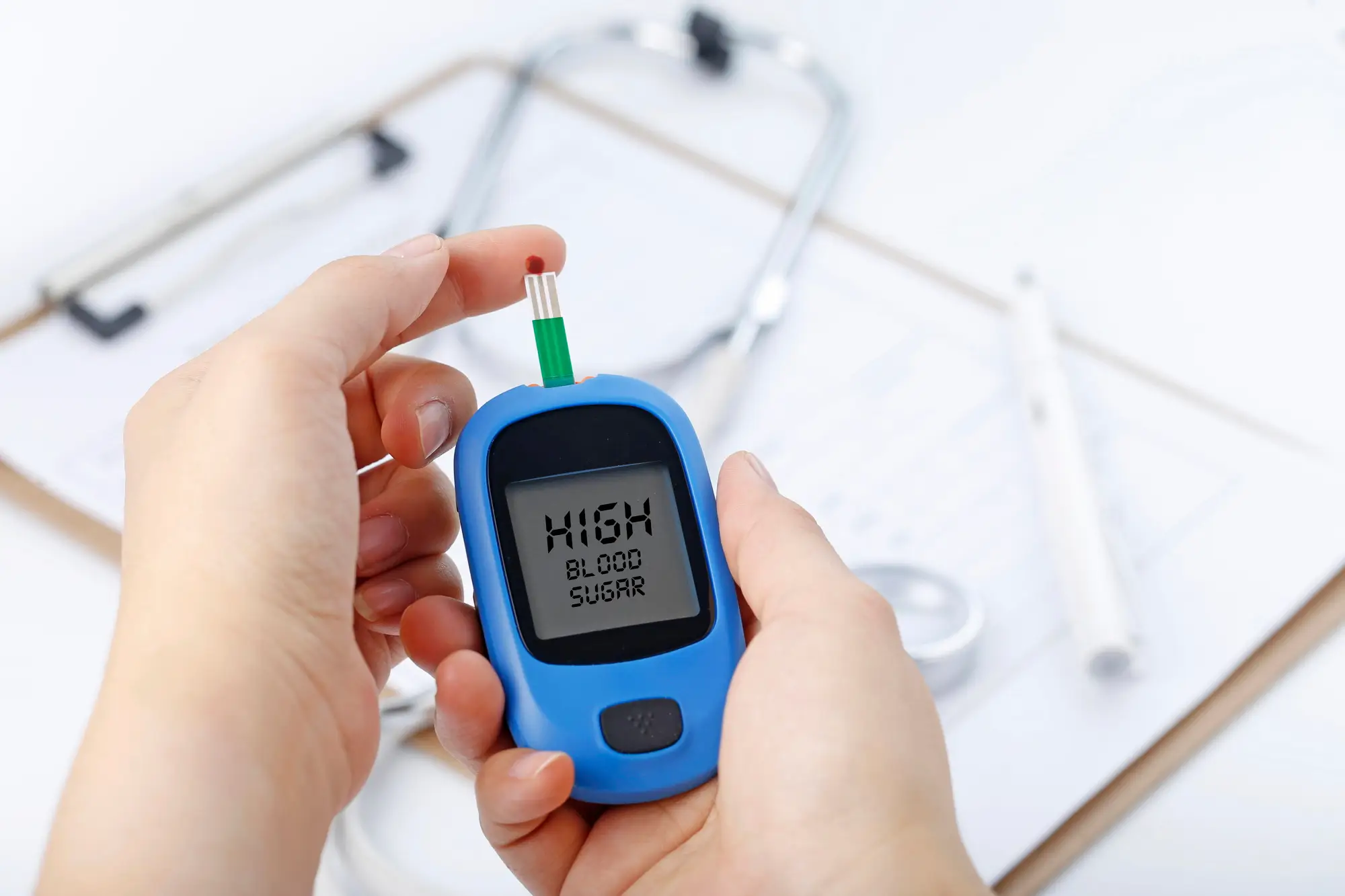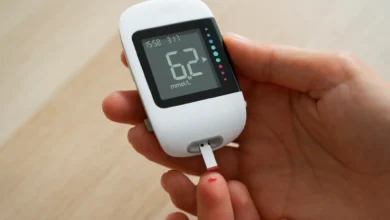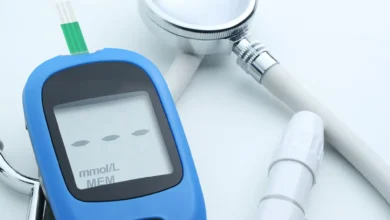There is a mutual influence between high blood pressure and diabetes, as each of them increases the risk of developing the other, in addition to sharing some common causes and risk factors, but infection with both of these diseases is associated with the occurrence of many serious complications, while changing lifestyle plays a decisive role in managing it. Both diseases and preventing these complications. Learn in this article about the relationship between diabetes and high blood pressure , and recommendations for lifestyle changes to manage both diseases.
Diabetes and high blood pressure often occur at the same time, and both diseases share a common causative factor, such as:
- Inactivity and lack of physical activity
- Obesity.
- Relying on an unhealthy diet.
- Insulin resistance.
Can diabetes lead to high blood pressure?
Glucose is considered the body’s source of energy. In order for the body to be able to use it, it must be inside the cells and not in the bloodstream. The hormone that transports glucose from the bloodstream into the cells is insulin. When a person develops insulin resistance , insulin will not be able to bring glucose into the cells, so it will not The body is able to use glucose as an energy source.
In the case of insulin resistance or type 2 diabetes, sugar accumulates in the blood , leading to damage to various tissues and organs of the body, including blood vessels and kidneys. Considering that both of them play a crucial role in maintaining blood pressure within the normal range, the damage Following them as a result of diabetes leads to high blood pressure .
High blood pressure is more common among people with diabetes than among people without diabetes. According to the Centers for Disease Control and Prevention (CDC), about 47% of adults in the United States suffer from high blood pressure or take medications to manage it. The condition, and at the same time, 2 out of every 3 people with diabetes suffer from high blood pressure.
Can high blood pressure cause diabetes?
High blood pressure may not directly cause diabetes , but it may increase the risk of developing it. People with high blood pressure usually suffer from insulin resistance and have an increased risk of developing diabetes compared to those with normal blood pressure. This may be due to some factors caused by high blood pressure , which in turn cause an increased risk of diabetes :
- Thickening of blood vessels.
- Obesity.
- Activating the immune system.
Complications of diabetes and high blood pressure
Diabetes, along with high blood pressure, negatively affects the health of the body, as they cause an increased risk of developing many diseases, such as cardiovascular disease and kidney disease. If these two diseases are not managed, this may be associated with many serious complications , such as:
- Having a heart attack
- Having a stroke.
- Eye problems.
- Kidney failure.
Managing your blood sugar levels and blood pressure can help prevent these complications.
Risk factors
In addition, diabetes and high blood pressure may increase the risk of developing the other, and they also share the same risk factors, which include:
- Weight gain or obesity.
- Sedentary lifestyle.
- An unhealthy diet.
- Exposure to chronic stress.
- Bad sleeping habits.
- Having a family history.
- Environmental factors such as exposure to air pollution.
Lifestyle changes are useful in managing both of these diseases, as some bad habits are risk factors for developing high blood pressure and thus increasing the risk of developing diabetes. These habits include smoking tobacco and consuming alcohol. A diet rich in sodium and low in potassium in the body is also considered a risk factor for developing diabetes. Factors that increase the risk of high blood pressure .
protection
Lifestyle changes are crucial to managing both type 2 diabetes and high blood pressure, including:
Maintain a healthy weight
For people who are obese or overweight, losing excess weight is a key factor in reducing the risk of high blood pressure and diabetes.
- The National Heart, Lung, and Blood Institute (NHLBI) indicates that losing 3-5% of body weight helps reduce high blood pressure .
- The CDC notes that losing 5-7% of body weight helps prevent prediabetes from developing into type 2 diabetes.
Doing physical activity
In addition to regular physical activity having many wonderful health benefits, it also helps manage blood sugar levels , reduce high blood pressure , and according to the CDC guidelines, which recommend following one of the following options:
- Do at least 150 minutes of moderate-intensity exercise every week.
- Do 75 minutes of vigorous exercise every week.
Moderate exercise includes brisk walking and swimming, and muscle-strengthening exercises are also a great option. People who have not been physically active for a long period of time should speak with a doctor for advice on an appropriate exercise plan.
Follow a healthy diet
Following a healthy diet is beneficial in controlling blood sugar levels , reducing the risk of high blood pressure on the one hand, and reducing high blood pressure in people with it on the other hand. The appropriate diet to manage blood pressure includes the following:
- Focus on foods rich in fiber, including whole grains.
- Eat plenty of fresh fruits and vegetables
- Avoid or reduce your intake of foods high in unhealthy fats, such as trans fats and animal fats.
- Reduce consumption of salt and sugar.
Avoid consuming alcohol
Alcohol consumption increases the risk of developing many diseases, including high blood pressure and diabetes , due to the great harm it causes to the body, including:
- Increased thickness of the arterial walls.
- Obesity and weight gain.
- Increased risk of diabetes
- Increased risk of high blood pressure
Quit Smoking
Smoking tobacco causes constriction of blood vessels, which leads to a temporary increase in blood pressure . It also increases the accumulation of plaque within the arteries, which may lead to chronic high blood pressure . Smoking also increases the risk of developing type 2 diabetes , in addition to that Smokers with diabetes are more likely to develop serious complications, including:
- Poor blood flow, which increases the possibility of infection and the risk of amputation of the foot or leg.
- Heart or kidney disease
- Retinopathy.
- Peripheral neuropathy.
Lifestyle change is the key to managing high blood pressure and diabetes , which includes following a healthy, low-carbohydrate diet, getting rid of excess weight, exercising regularly, avoiding alcohol consumption, and quitting smoking. This is useful in preventing the serious complications caused by it. Both diseases help change lives radically.

 Is it possible to recover diabetes?
Is it possible to recover diabetes? Types of diabetes
Types of diabetes Insulin resistance, prediabetes, diabetes, what is the difference between them?
Insulin resistance, prediabetes, diabetes, what is the difference between them? How does insulin prevent fat burning?
How does insulin prevent fat burning?